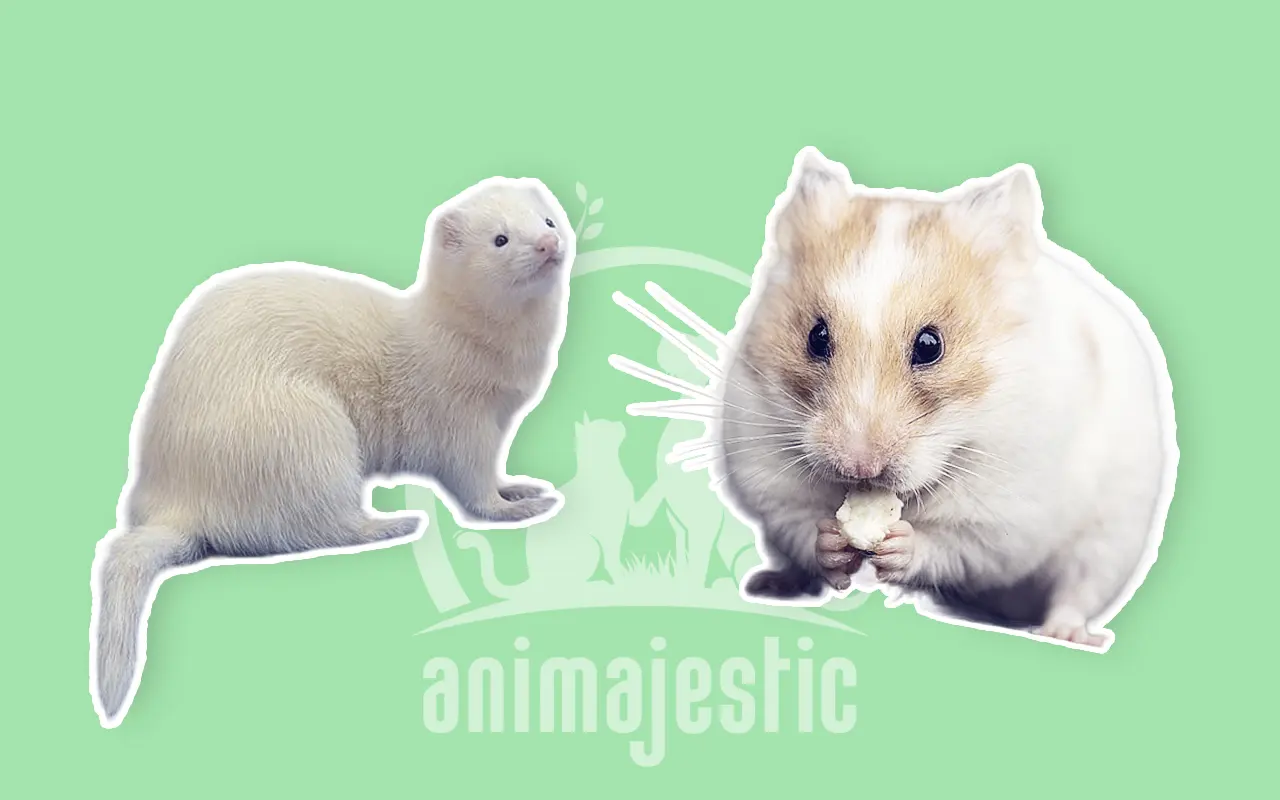Can Ferrets Eat Hamster Food? Well, Ferrets and hamsters are popular pets that often share homes with their human companions. While they may coexist peacefully, their dietary needs are quite different.
We will be using this opportunity to delve into the nutritional requirements of ferrets and hamsters, discussing the potential consequences of feeding ferrets hamster food and providing recommendations for maintaining a healthy ferret diet.
Ferret’s Dietary Needs: A Closer Look
Ferrets (Mustela putorius furo) are domesticated members of the mustelid family, which also includes weasels, minks, and otters. As carnivores, their diet in the wild primarily consists of birds, small mammals, and insects. Their digestive systems have evolved to efficiently process high-protein, low-fiber foods.
The Importance of Protein
Protein is essential for ferrets as it provides the necessary amino acids for growth, tissue repair, and immune function. High-quality animal proteins contain the full range of essential amino acids that ferrets need. The ideal protein content for ferrets is around 32-38%, with some experts even recommending levels as high as 40%.
The Role of Fats
Fats are a vital energy source for ferrets, providing essential fatty acids and aiding in the absorption of fat-soluble vitamins. Ferrets require a diet containing 15-20% fat, with a focus on animal-based fats. These fats help maintain healthy skin and fur and support overall well-being.
Limited Fiber and Carbohydrates
Ferrets have a short gastrointestinal tract, which means they are unable to digest high-fiber foods efficiently. Their diet should contain less than 3% fiber. Additionally, ferrets’ digestive systems are not well-equipped to handle carbohydrates, so their diet should consist of minimal carbohydrate content.
Hamster’s Dietary Needs: A Closer Look
Hamsters are small rodents that belong to the Cricetidae family. As omnivores, their diet in the wild includes seeds, grains, fruits, vegetables, and occasional insects. Commercial hamster food aims to provide a balanced diet that caters to their nutritional requirements.
Protein and Fat Requirements
Hamsters require a diet containing 15-20% protein and 4-7% fat. These levels support growth, reproduction, and overall health. However, it’s important to note that the protein and fat content in hamster food is derived from both plant and animal sources.
Higher Fiber and Carbohydrate Content
Hamsters can efficiently process higher levels of fiber and carbohydrates than ferrets. Their diet should contain 6-15% fiber, which aids in digestion and helps maintain a healthy gastrointestinal system. Carbohydrates are also an essential energy source for hamsters.
The Consequences of Feeding Ferrets Hamster Food
Given the significant differences in nutritional requirements between ferrets and hamsters, feeding ferrets hamster food can lead to several health problems:
- Protein deficiency: Hamster food lacks the necessary animal protein content required by ferrets, which can result in weakened immune systems, muscle atrophy, and poor coat condition.
- Digestive issues: The high fiber content in hamster food can cause digestive problems for ferrets, such as diarrhea, bloating, and gastrointestinal discomfort.
- Carbohydrate-related health problems: Ferrets are not well-adapted to process carbohydrates, and a diet high in carbs can lead to obesity, insulinoma, and other health complications.
- Nutrient deficiencies: Ferrets require specific nutrients like taurine and certain amino acids that are not present in adequate amounts in hamster food. A diet lacking these essential nutrients can result in severe health problems, including heart disease and neurological disorders.
Recommendations for a Healthy Ferret Diet
To ensure that your ferret receives proper nutrition, follow these guidelines:
- Ferret-specific food: Choose a high-quality ferret food that contains the appropriate levels of animal proteins, fats, and minimal fiber. These formulations are designed to meet the unique nutritional needs of ferrets.
- Whole prey: Feeding your ferret raw or freeze-dried whole prey (such as mice or chicks) can provide them with a balanced, species-appropriate diet. This option closely mimics their natural diet in the wild.
- Avoid feeding human food: Human foods, especially those high in sugar or carbohydrates, can be harmful to ferrets. Stick to a diet specifically designed for ferrets to ensure they receive the proper nutrients.
- Consult a veterinarian: If you have concerns about your ferret’s diet or health, consult a veterinarian experienced with ferrets. They can provide personalized recommendations based on your pet’s unique needs.
Reminder
It is crucial to avoid feeding ferrets hamster food, as it does not meet their nutritional requirements and can lead to various health problems. By providing your ferret with a species-appropriate diet, you can help ensure their long-term health and happiness.
